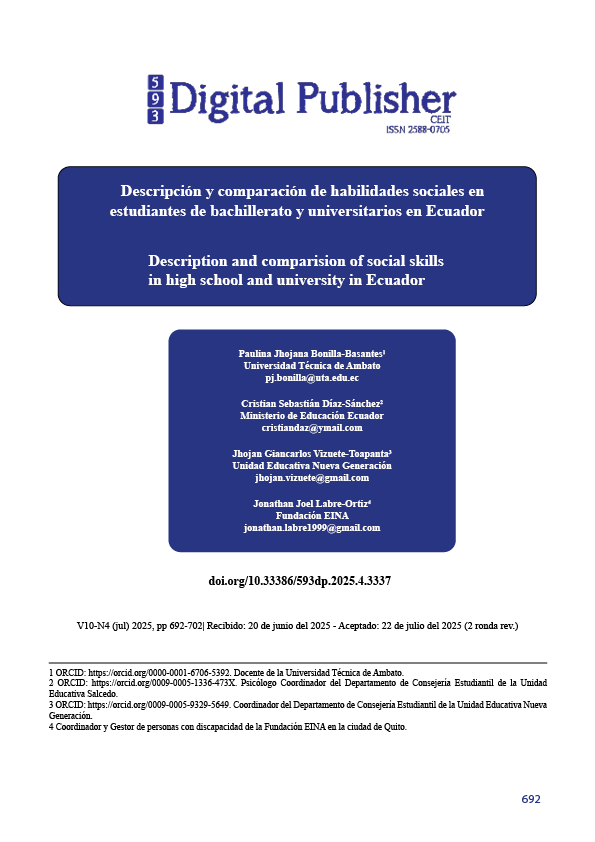Description and comparision of social skills in high school and university in Ecuador
Main Article Content
Abstract
Social skills are essential for establishing effective interpersonal relationships. This study aimed to describe and compare social skills between high school and university students, considering their potential association with evolutionary, contextual, and educational factors. A quantitative, non-experimental, and cross-sectional design was employed. The sample consisted of 159 high school students (60% female, 40% male), aged 14 to 18 years. The Social Skills Scale (EHS) was used as the primary assessment tool. Results revealed statistically significant differences between the two groups, with university students demonstrating higher levels of social skills. Specifically, 53.8% of university students were categorized at a high level of social skills, while 46.2% of high school students reached this level, with the majority (63.8%) falling within the medium range. In summary, the findings suggest that educational level is directly related to the development of social skills, showing a positive evolution in the university stage. On the other hand, from an applied perspective, these results can guide educational interventions and personal development programs focused on strengthening social skills from an early age, especially in school contexts. Likewise, they provide useful empirical evidence for teachers, guidance counselors and educational policy makers interested in promoting key socioemotional competencies for academic and professional life.
Downloads
Article Details

This work is licensed under a Creative Commons Attribution-NonCommercial-ShareAlike 4.0 International License.
1. Derechos de autor
Las obras que se publican en 593 Digital Publisher CEIT están sujetas a los siguientes términos:
1.1. 593 Digital Publisher CEIT, conserva los derechos patrimoniales (copyright) de las obras publicadas, favorece y permite la reutilización de las mismas bajo la licencia Licencia Creative Commons 4.0 de Reconocimiento-NoComercial-CompartirIgual 4.0, por lo cual se pueden copiar, usar, difundir, transmitir y exponer públicamente, siempre que:
1.1.a. Se cite la autoría y fuente original de su publicación (revista, editorial, URL).
1.1.b. No se usen para fines comerciales u onerosos.
1.1.c. Se mencione la existencia y especificaciones de esta licencia de uso.
References
M. (2023). La relación entre las habilidades sociales, bienestar psicológico y rendimiento académico en estudiantado universitario de Chimbote, Perú. Revista Electrónica Educare, 27(2), 20-33.
Arnett, J. J. (2000). Emerging adulthood: A theory of development from the late teens through the twenties. American Psychologist, 55(5), 469-480. https://doi.org/10.1037/0003-066X.55.5.469
Caballo, V. (1993). Manual de Evaluación y Entrenamiento de las Habilidades Sociales (7.a ed.). SIGLO XXI.
Caldera Montes, J. F., Reynoso González, O. U., Angulo Legaspi, M., Cadena García, A., & Ortíz Patiño, D. E. (2018). Habilidades sociales y autoconcepto en estudiantes universitarios de la región Altos Sur de Jalisco, México. Escritos de Psicología (Internet), 11(3), 144-153. https://doi.org/10.5231/psy.writ.2018.3112
CELAC. (2023). Inclusión y juventudes en América Latina y el Caribe (1, p. 61). Programa de las Naciones Unidas para el Desarrollo. https://www.undp.org/sites/g/files/zskgke326/files/2024-04/es_oij_dg_cuadernillo1_inclusion_1.pdf
Gismero, E. (2002). Manual Escala de Habilidades Sociales (EHS) (2.a ed.). TEA.
Gualpa, V. M. G., & Gonzalez, I. Á. G. (2025). Resiliencia y habilidades sociales en adolescentes. Revista Científica Arbitrada Multidisciplinaria PENTACIENCIAS, 7(1), 36-46. https://doi.org/10.59169/pentaciencias.v7i1.1359
Hernández, D. C., Silva, M. L., Ramírez, F. D., & Llanto, J. C. Q. (2025). Combinación del aprendizaje invertido y formación de habilidades sociales para mejorar el rendimiento académico universitario. Revista de Ciencias Sociales, 31(2), Article 2. https://doi.org/10.31876/rcs.v31i2.43774
Instituto Nacional de Estadísticas y Censos. (2024). Pobreza Multidimensional. Instituto Nacional de Estadística y Censos. https://www.ecuadorencifras.gob.ec/pobreza-multidimensional/
Kourtesis, P., Kouklari, E.-C., Roussos, P., Mantas, V., Papanikolaou, K., Skaloumbakas, C., & Pehlivanidis, A. (2023). Virtual Reality Training of Social Skills in Autism Spectrum Disorder: An Examination of Acceptability, Usability, User Experience, Social Skills, and Executive Functions (No. arXiv:2304.07498). arXiv. https://doi.org/10.48550/arXiv.2304.07498
Lacunza, A. B., & González, N. C. de. (2011). Las habilidades sociales en niños y adolescentes. Su importancia en la prevención de trastornos psicopatológicos. Fundamentos en Humanidades, XII(23), 159-182.
Mejía, J. L. S., & Rojas, D. L. (2024). Autoestima y habilidades sociales en adolescentes de una unidad educativa de Latacunga, 2023. Maskana, 15(2), Article 2. https://doi.org/10.18537/mskn.15.02.03
Moreno, A. G., & Jurado, M. del M. M. (2022). Las habilidades sociales y su relación con otras variables en la etapa de la adolescencia: Una revisión sistemática. Revista Iberoamericana de Psicología, 15(1), Article 1. https://doi.org/10.33881/2027-1786.rip.15111
Organización Mundial de la Salud. (2024). La salud mental de los adolescentes. https://www.who.int/es/news-room/fact-sheets/detail/adolescent-mental-health
Organización Panamericana de Salud. (2018). CD56/8, Rev. 1—Plan of Action for Women’s, Children’s, and Adolescents’ Health 2018-2030. https://iris.paho.org/handle/10665.2/49609
Rosales, J., Caparrós, B., Molina, I., & Alonso, S. (2013). Habilidades Sociales (1.a ed.). McGraw-Hill Education.
Sánchez-Bolívar, L., Escalante-González, S., Vázquez, L. M., & Martínez-Martínez, A. (2025). Habilidades sociales del alumnado adolescente en contextos multiculturales. Revista Electrónica Educare, 29(1), Article 1. https://doi.org/10.15359/ree.29-1.18589
Tomé-Fernández, M., Fernández-Leyva, C., & Olmedo-Moreno, E. M. (2020). Exploratory and Confirmatory Factor Analysis of the Social Skills Scale for Young Immigrants. Sustainability, 12(17), 6897. https://doi.org/10.3390/su12176897
UNESCO. (2024). Violencia y acoso escolar: La UNESCO reclama una mejor protección de los estudiantes. https://www.unesco.org/es/articles/violencia-y-acoso-escolar-la-unesco-reclama-una-mejor-proteccion-de-los-estudiantes
UNICEF. (2018, julio 31). Programa de Cooperación 2019 – 2022. https://www.unicef.org/ecuador/informes/programa-de-cooperaci%C3%B3n-2019-2022
UNICEF. (2024). Inclusión social | UNICEF. Inclusión Social. https://www.unicef.org/ecuador/inclusi%C3%B3n-social?utm_source=chatgpt.com
Velalagan, R., Wu, W. T., John, J. R., Lin, P.-I., & Eapen, V. (2024). Effectiveness of Social Skills Interventions in young people aged 12 to 25 years with Autism Spectrum Disorder: Systematic Review and Meta-analysis. Research Square. https://doi.org/10.21203/rs.3.rs-5113751/v1
Vinueza-Solórzano, A. M., Campoverde, R. E., Portalanza-Chavarría, C. A., de Freitas, C. P. P., Hutz, C. S., & Vazquez, A. C. S. (2023). Adaptation and validation of the Adult Dispositional Hope Scale in the Ecuadorian context. Psicologia: Reflexão e Crítica, 36(1), 3. https://doi.org/10.1186/s41155-023-00246-2
You, X.-R., Gong, X.-R., Guo, M.-R., & Ma, B.-X. (2024). Cognitive behavioural therapy to improve social skills in children and adolescents with autism spectrum disorder: A meta-analysis of randomised controlled trials. Journal of Affective Disorders, 344, 8-17. https://doi.org/10.1016/j.jad.2023.10.008





